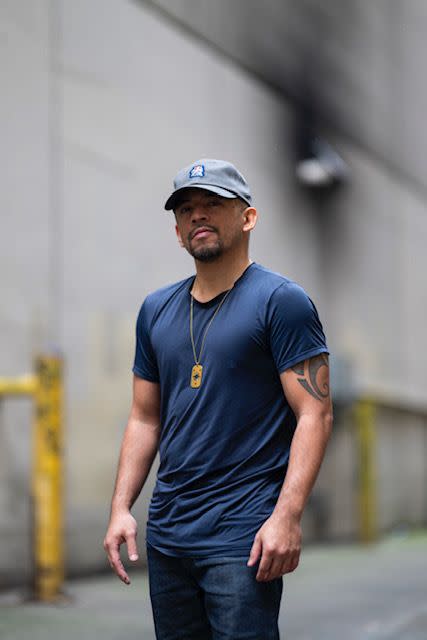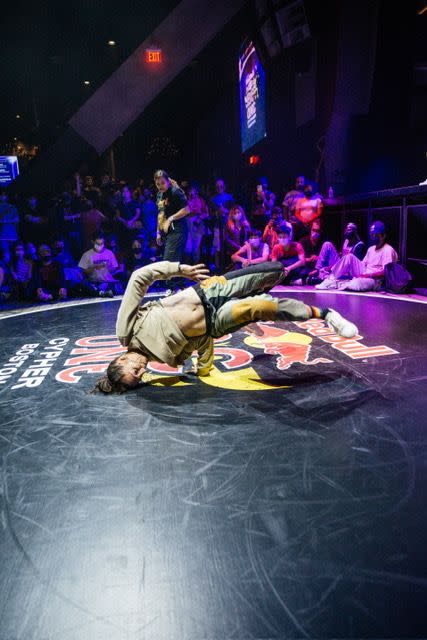Breaking The Rules: These Queer Street Dancers Are Leading With Authenticity
!["[Breakdancing] is very masculine, macho, and it feels like there's no room for anything different,” says breaker Luis 'Dosu' Carrera. <span class="copyright">Credit: Red Bull Media House</span>](https://s.yimg.com/ny/api/res/1.2/dtRV04XfJde2PUhqr.zhsw--/YXBwaWQ9aGlnaGxhbmRlcjt3PTEyNDI7aD04Mjg-/https://media.zenfs.com/en/the_huffington_post_584/bbe9c747da80df29d22b5da2ea9912aa)
Streetdance,as a competitive sport, has had a powerful niche following for decades. But we’ve all recently been inundated with the conversation about what breaking should look like because of its Olympics debut — and Australian competitor Rachael “Raygun” Gun’s performance-turned-meme. While her routine was chaotic, to say the least, it’s looking like she’ll be fine. Meanwhile, breakdancing is not scheduled to be included in the 2028 Los Angeles Olympics.
Back to real breaking, though. The style of dance, rooted in 1970s Black culture during the inception of hip-hop in New York, has grown to become a globally recognized sport, spawning numerous competitions, including Red Bull’s Lord of the Floors, which debuted in 2001. Red Bull, widely known for its intentionally curated spaces for showcasing street dance talent, held its second coming of the Lord of the Floors, with 16 two-person crews battling it out, this past April in Seattle. A lot has changed since their first version of this competition 23 years ago — including how queer dancers are navigating the scene.
One dancer present at Lord of the Floors, b-boy Gabriel ‘Wicket’ Jaochico, is especially noteworthy. A musical artist, b-boy and lecturer at Texas State University, Wicket is still one of the few openly gay figureheads in the breakdancing community. Now 45, Wicket has only recently come out publicly, a move preceded by years of anxiety and internal dialogues about emotions he struggled to grapple with. While the dance world has always been a more open space for queer people, some hip-hop spaces clung hard to the homophobia that’s been ingrained in so much of American music culture.
“Not knowing how to express my feelings, or to be brave enough to talk to somebody about it, I would write and record songs about [being gay], and whenever I was done, I would just put it away,” Wicket, who has competed in and hosted several street dance events, tells me. “This happened several times over the years. By the time I turned 40, I was feeling a certain way again.” Wicket would later come across these songs in a digital folder that he believed were ready to be released into the world.
Wicket says that he planned on coming out on his 40th birthday but still felt anxious about confronting his internal conflict. All it took was one more year. “On my 41st birthday, I gave myself the best gift, and published all the songs,” he says.

Wicket’s relationship to hip-hop music is complicated. He says that the homophobic lyrics he hears are triggering but simultaneously serve as fuel for his personal development. “As a hip-hop junkie, we love the rawness. We love the rap roots. We love the classics,” he says, adding that when he hears lyrics that feel like a stab in the back (the other oft-dropped f-bomb), he tries to flip that energy into something positive.
And as the culture surrounding LGBTQIA+ discourse evolves, auxiliary movements like breaking also change. The space and craft created and honed by Black and Latino dancers has graciously opened up to breakers of all ethnicities (Wicket is of Filipino descent), but honoring those roots is important. The foundational tenets are based on agility, ingenuity, freedom and a little bit of danger — which is why it feels natural for queer dancers to want to experience the sport as their most authentic selves.
Luis “Dosu” Carrera, 31, a Philadelphia-based b-boy, says that today, being an openly gay breakdancer is easier. However, initially, there wasn’t much community to bolster and support you, and during that time, only his close friends knew he was gay. “[Breakdancing] is very masculine, macho, and it feels like there’s no room for anything different,” Dosu says.
Dosu came out to close friends in 2015 and made this identity more public in 2019. At first, he says, many people in the community didn’t know how to react. He recalls certain friends, all of a sudden, not wanting to disrobe around him in the changing rooms. Dosu says he understands the initial awkwardness since breaking, as an art, is so painfully linked to hypermasculine music culture.
In many ways, evolving attitudes toward Wicket and Dosu show how masculinity is recognized and interpreted by the larger hip-hip and breaking community. But for queer female dancers like Randi “Rascal” Freitas, 36, based in Los Angeles, gender roles and expectations get increasingly difficult to navigate.
“Being a queer female just adds another level of going against the hetero-masculine norms in the breaking world,” Randi says. She explains the wide-held misconception that it’s easier for gay female breakers to find acceptance because masculinity is praised in the scene. “As an often masculine presenting b-girl, I don’t find this to be true… In all the dance spaces I’m in, in fact, femininity in women is praised over masculinity in women or AFAB dancers.”
And, of course, the topic of female desirability can’t be ignored in the context of a masculine-coded sport either, which is one of the reasons why she also took a minute to come out publicly. “As a b-girl, you also get the feeling at times that b-boys are only interested in helping you if they think you’re available,” Randi says. “I was afraid no one would teach or help me if they knew I didn’t date men. And when I did start coming out, I was met with a lot of questionable responses.”

Once, Randi tells me, one of her crew members even tried to bring Christianity into a discussion. “I think it’s gotten a lot better,” she says. “As more people come out and make themselves visible, I think the community is realizing there’s a lot more of us amongst them than they thought.” Randi is set to compete as a wildcard this fall in the Red Bull BC One US National Final in Los Angeles.
Even though Randi and her peers all fall under the LGBTQ umbrella, their experiences with hip-hop and breakdancing attitudes towards queerness are very different, and for good reason — the scene is still heavily hetero-masc coded.
And while there’s no easy way to execute a game plan that’ll ensure the total comfort and easy integration of queer breakdancers into mainstream breakdancing communities, Wicket, Dosu and Randi provide a glimpse into a future where sexuality and gender expression are less relevant to how the community relates to one another. Hopefully, for the younger queer dancers finding their way on the scene, all that matters is your ability to jump into the cypher and slay.

